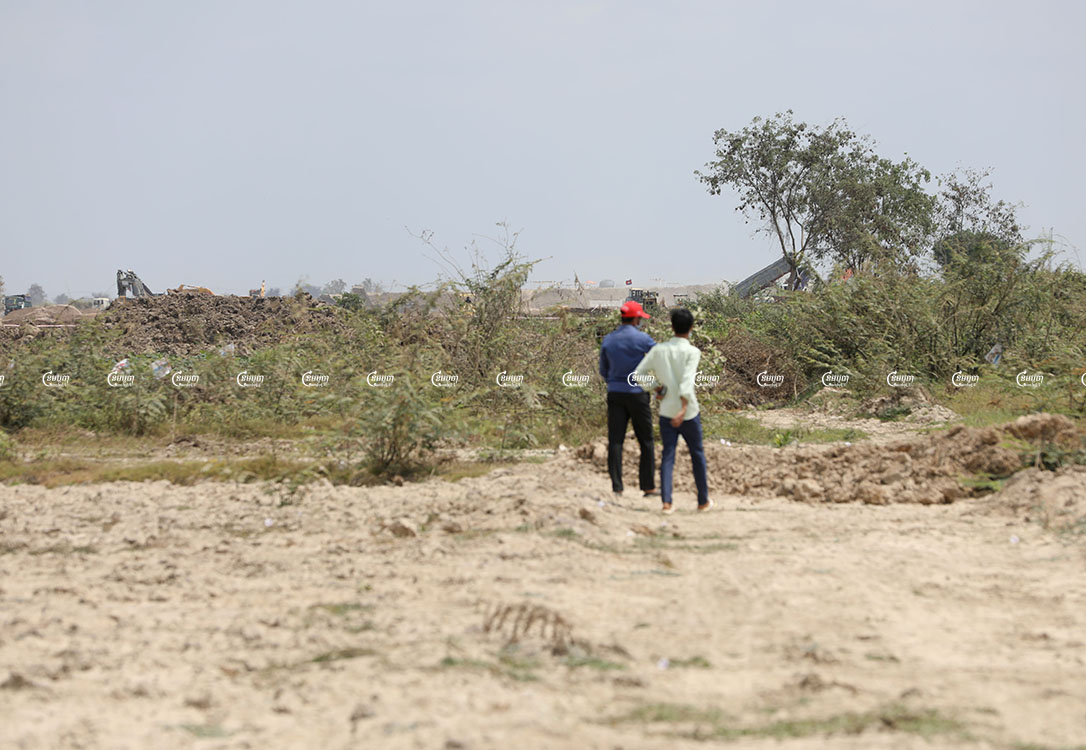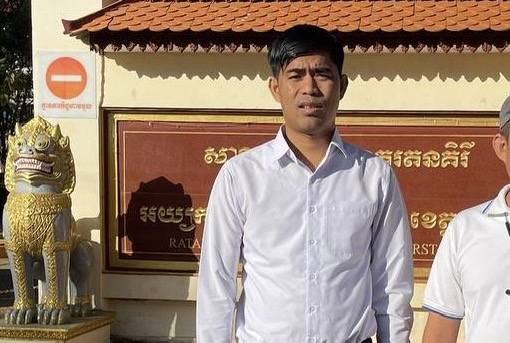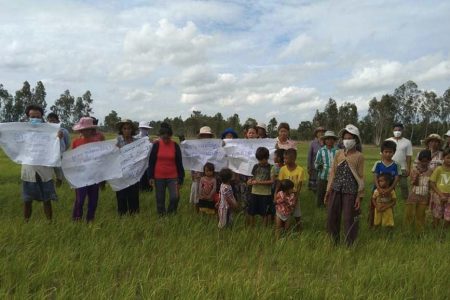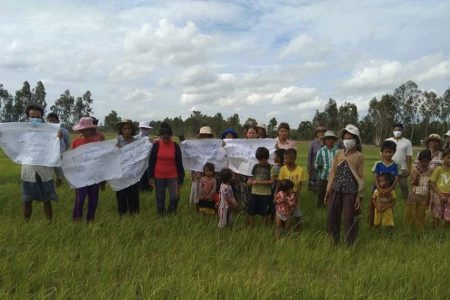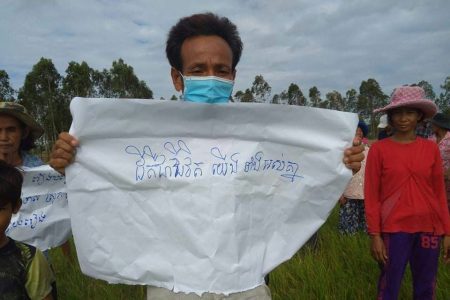Over the past two years, hundreds of families in Kandal and Svay Rieng provinces have seen farmland they have cultivated for years and sometimes decades confiscated by the state as part of large scale development projects.
In some instances villagers are paid for their land or crops, but often at a price far lower than market rate. In others, villagers are made to move without compensation, with authorities claiming they have been illegally squatting on the land.
While authorities defend such clearance operations saying the projects serve the public interest, families and rights monitors say the move often effectively takes land from the poor to give to the wealthy and powerful.
In Kandal province, more than 300 families from seven villages in Ang Snuol district, have been blocked from farming their rice crops while locked in a land dispute with the Defense Ministry over 280 hectares of land, which authorities said has been reserved for a dump site and military use.
Also in Kandal province’s Kandal Stung district and Takeo province’s Bati district, more than 300 families living on 400 hectares of land have been blocked from their farmland amid a land dispute as the state-owned State Secretariat of Civil Aviation and the Overseas Cambodia Investment Corporation readies the land for a new $1.5 billion airport.
And in Svay Rieng, a canal project under management of the Ministry of Water Resources, has impacted more than 99 hectares in three communes in Svay Chrum district.
Those projects have left hundreds of rural Cambodians unable to cultivate their rice crop even as they struggle with the fallout of the pandemic.
Yan Sokhem, from Ang Taset village, Ang Snuol district, who has 0.40 hectares of farmland, said she and other families have lived and farmed the land since 1979. They have been blocked from accessing their land since 2020.
“I don’t have another farmland elsewhere for farming, now people in the village are free and have nothing to do because we cannot cultivate our rice,” she said. “Before we only paid for food but now, we spend more money to buy milled rice from the market.”
“The rich get richer, the powerful people hold hundreds of hectares of land, but for the poor they can hardly find food to eat,” she said. “My son borrowed money from a bank to start a business, but due to COVID, the business was suspended, and we sold the car to pay off the loan.”
Koy Tith, a villager from nearby Khlong village, where his 0.60 hectares of farmland has been unfarmed for a year due to the dispute with the Defense Ministry, said his family could previously grow about 3 tons of paddy rice a year.
“Now there is no choice but just to try to earn money to buy rice, otherwise we will have nothing to support the family,” he said.
Villagers in the commune have so far rejected a compensation offer by the government to pay 0.4 cents per square meters and are asking for $3-5, which is the market rate.
A villager from Kampong Talong village, Kandal Stung district, who fled following a violent protest early this month and asked not to be named, said he has not farmed for three years after his 0.4 hectares of land was cleared by the airport developer. Another 0.3 hectares he owns has become flooded due to the development and is no longer arable. Previously, they could harvest about 4 to 5 tons of paddy rice per season.
“Before my family could earn from farming, and I also worked as construction workers for additional jobs but since the authorities blocked the people’s farmland [and I had to flee], I can do nothing not even construction work,” he said.
He said his family now depends on support from two children who work as construction workers.
“My other two children are studying at the university, I borrowed money from the bank for their school fee,” he said.
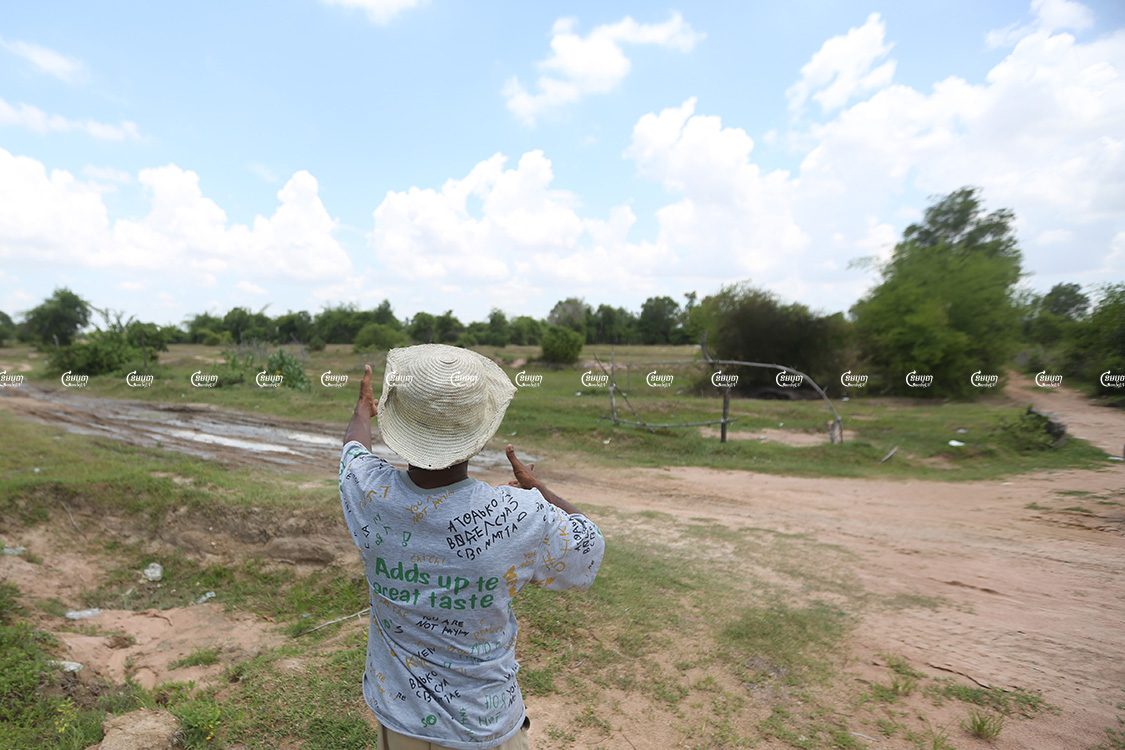
While many in Ang Snuol district locked in the dispute with the Defense Ministry insist they have been farming for decades — before the land was classified as state land — Kandal provincial Governor Kong Sophorn told CamboJA that the state has the right to the land and the compensation has been adequate. Sophorn said they have been paid for the loss of their crops for four years.
“People know that it is state land, but they still demand a higher price and the government offers is already too much for the cost of crop, not for the land,” he said. “If they do not agree, we will still take over the land because it is state property and if they protest and use violence, we will arrest them according to the law.”
Sophorn dismissed the concerns of the villagers saying he believed there was someone inciting locals to take over the land and insist on a profit. “Even without this land, it does not affect their livelihood because they have other farmland elsewhere and their house, they just want a higher price,” he said.
The new airport in Kandal Stung district, meanwhile, is being built on private property, with compensation depending on negotiations between the developer and landowners. But, he said, authorities have the right to block off the land in the name of national interest.
“We have been asked to block the people from entering the areas to implement the project properly,” he said. “Some places were flooded by rain and affected a large number of projects that have already been done, so we, the relevant authorities, must take action.”
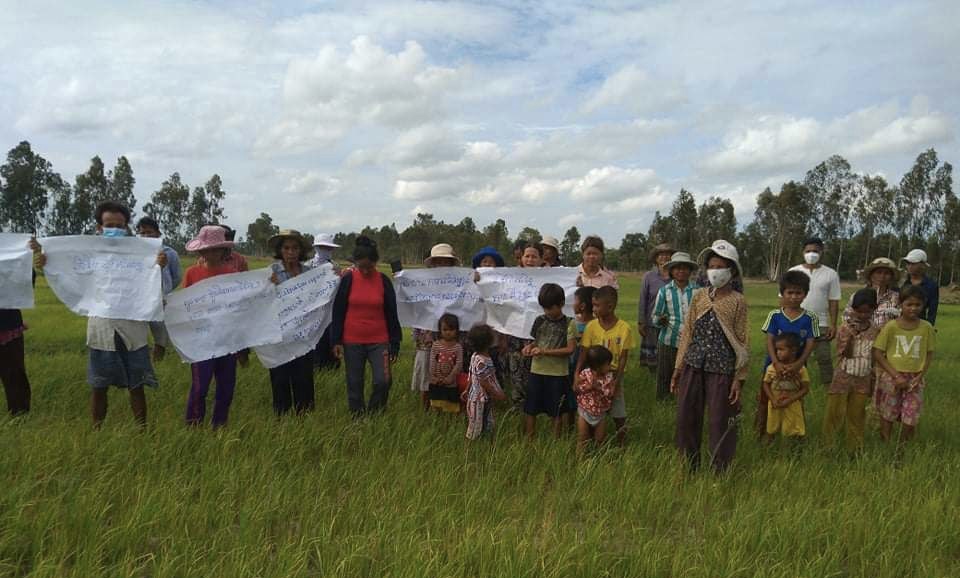
In Svay Rieng province, meanwhile, families affected by canal restoration project recently accepted a compensation offer after two representatives were charged under the COVID law for leading a protest in August.
Pol Diep, a farmer in Samraong village, Svay Rieng province’s Svay Chrum district, whose 2 hectares of farmland has been affected by the canal restoration project, said she received a total of $2,400 in compensation.
“Every year, I could sell some paddy rice for some revenue to make a living, and now it is over, and next year I do not know what I will do,” she said.
She said that while this year her family has enough rice to eat, the amount paid is too little to buy new land. “There is no land to farm, no rice to grow in the next year, only to do construction or migration,” she said.
Another farmer, Prum Hoeun said that his 2.7 hectares of farmland was affected by the canal restoration project. Though he too received compensation, he said it’s not enough to live off of.
“From next year, I don’t know what life will depend on because I cannot do anything else other than farming. I sold paddy rice to support my family,” he said.
Hem Sarith, the governor of Svay Chrum district said that the canal rehabilitation project affected farmland in three communes in Svay Chrum district, but that nearly all the impacted families accepted the compensation.
“The authorities still allow farmers to harvest crops on the land this year,” he said. “This does not affect their livelihood because [authorities] provide compensation and they also have farmland elsewhere; they also have another business not just farming.”
But rights advocates say that families really do struggle following such land takeovers, with most truly living hand-to-mouth.
Theng Savoeun, president of the Coalition of Cambodian Farmer Community, said that without farmland more people will likely have to migrate for work. He urged the government to improve its response to land disputes that take into consideration the human rights of those affected.
“Their lives depend on farming and when land is confiscated and no solution is provided, it will create injustice and social development impacts such as domestic violence,” he said. “Lack of housing or farmland causes the most suffering for rural residents, [the people] will fall into poverty, pushing them to face worse livelihoods and health, and will see more migration.”


